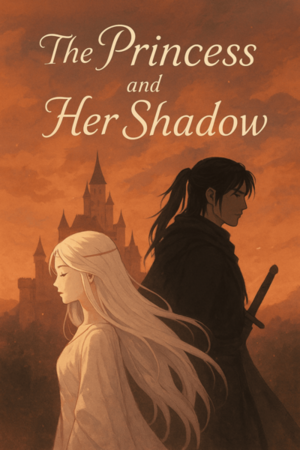Chapter 27:
Chapter 27 — “The Last Kiss”
Filthy You Are The Cutest
The sea waited for them.
Evening stretched long and pale across the cliffs, the light fading into a colorless bruise. Gulls circled overhead, crying like children who had lost their voices. Below, the waves churned—gray, restless, hungry.
Himari and Mizuki stood side by side at the edge, their hands still stained faintly red from earlier. Neither spoke for a long time. Only the wind filled the silence, cutting through the salt in their hair.
Mizuki’s eyes gleamed with that familiar feverish light, something between love and surrender.
Himari’s were tired—soft, trembling, as though she had finally run out of reasons to resist.
> “Then let’s die together,” Mizuki whispered.
Her breath brushed Himari’s ear. It wasn’t a plea. It was a promise.
Himari’s fingers tightened around hers. The sky was dim now, the first drops of rain falling. It smelled like the night they had first met—a scent of wet paint and wisteria.
> “You really want this?” Himari asked quietly.
“I don’t want to live in a world without you.”
Mizuki’s smile was small, cracked, and beautiful. “If love means losing myself, then let me be lost completely.”
The waves below roared louder, calling them closer.
--
They walked toward the cliff’s edge, barefoot. Pebbles crunched underfoot.
Each step felt lighter than the last.
Himari thought of Reina—her laughter, her blood, the way the body had hit the water with a dull sound. It had never stopped echoing in her dreams.
Maybe this was justice. Maybe this was love. Maybe both.
> “Do you think they’ll remember us?” Himari asked.
“They never did before,” Mizuki said. “But that’s okay. We’ll remember each other.”
She turned to her, the rain sliding down her cheek like tears she no longer had to cry. Himari wanted to say something—anything—but her voice caught in her throat. Instead, she leaned forward and kissed her.
It was soft. Trembling. Tasting of salt and despair.
Their lips met like the last flame flickering in a dying world.
---
The sea below blurred into white foam.
Mizuki broke the kiss, laughing quietly. “You taste like the rain.”
“And you taste like goodbye,” Himari said.
For a moment, neither moved.
Mizuki took a deep breath, eyes fluttering shut. “When I was a kid,” she said, “I used to dream of disappearing. Just… walking into the water and never coming back.”
Himari watched her profile against the storm. “You don’t have to disappear.”
“But I already did. The day you smiled at me, I stopped being real.”
She stepped closer until their foreheads touched.
> “If I vanish, will you follow me?”
“Always,” Himari whispered.
---
Lightning split the horizon, a thin scar across the sky.
Below them, the sea stretched wide, endless. Above, the first thunder rolled.
It sounded like applause.
They stood together, two silhouettes trembling against the wind.
Mizuki reached up and brushed a strand of hair from Himari’s face.
Her fingers were cold but steady.
> “Close your eyes,” she said.
“Why?”
“Because it’s easier if you don’t see it coming.”
Himari obeyed.
The world dimmed. The rain hit harder now, soaking them both.
Mizuki smiled through the tears, though she couldn’t tell if they were hers or Himari’s anymore.
She leaned close, whispering against her ear:
> “Even if I rot in the sea, I’ll still love you.”
And together, they stepped forward.
---
The fall was soundless.
For a heartbeat, they hung between sky and sea—weightless, free, infinite.
Then the waves opened like a mouth.
Water swallowed everything: air, screams, warmth, color.
The world became blue and silent. Their fingers brushed one last time before the current tore them apart.
Mizuki felt nothing but cold.
Himari’s face flickered in her mind, pale and smiling.
The sea pressed harder against her chest, demanding breath, demanding surrender.
Is this what love feels like? she thought.
To drown and still smile?
Her lungs burned. Her body began to drift.
Somewhere, she thought she heard Himari’s voice, faint and distant, calling her name. Or maybe it was the tide.
---
At dawn, the rain had stopped.
The fishermen found only one body tangled in seaweed near the rocks.
A young girl, school uniform torn, lips curved into a faint smile. Her hair was black as ink, her hands pale and stiff.
In her grasp was a seashell, cracked in half.
Inside it, someone had written with red ink:
> “Smile for me.”
The police called it a suicide. The newspapers wrote two paragraphs and moved on.
No one asked which girl had survived.
No one dared.
---
Days later, the sea returned a notebook. The pages were ruined, the ink smeared.
But one page remained legible — a painting.
Two girls under a storm, holding hands, smiling.
The colors were distorted, running together like blood in water.
Below it, Mizuki had written:
> “Love is the prettiest way to die.”
---
Weeks passed. Saint Elora reopened. Students whispered in the hallways.
In the art room, the broken glass was replaced, the walls repainted, the smell of turpentine covering what had happened there.
Yet every night, when the wind blew from the sea, the sound of dripping water echoed faintly—like footsteps.
And sometimes, in the reflection of the window, a faint smile appeared beside one’s own.
---
On the anniversary of the tragedy, a teacher sorting old files discovered a photograph tucked inside an unfinished sketchbook.
Two girls beneath a blooming wisteria tree.
One smiling brightly, the other with her face scratched out entirely.
On the back, a single sentence, written in trembling cursive:
> “Only one of us learned how to smile.”
---
The sea never gave back the second body.
Some say the tides carried her far away.
Others whisper she still walks the shore at night, sketchbook in hand, humming an old song under her breath.
And when the moonlight hits the cliffs just right, two shadows can be seen standing together — hand in hand, swaying gently with the wind.
No one dares to go closer.
Because if you listen carefully, the wind sounds like a voice calling softly:
> “Smile for me… one last time.”




Please sign in to leave a comment.